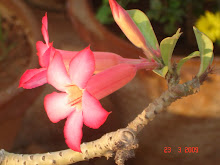అవి మీతోనూ పంచుకుందామని. వారి మాటలలోనే చదవండి.
I am a biochemist with some expertise in molecular biology and genetic
engineering. I am not opposed to biotechnology in general nor am I
opposed to it in agriculture. If a particular variety of brinjal
becomes susceptible to disease because of a mutation and a corporation
rectifies it through biotechnology, I would welcome it. What is
happening now is quite different.
Let me explain the reasons why I am
vehemently opposed to it. And my reasons are based on experience with
other genetically modified (GM) crops.
1. The main argument for genetically engineered brinjal is that the
natural plant is susceptible to FSB (fruit and shoot borer), that
chemical treatment to remove FSB is expensive and bad for the
environment, and that BT brinjal overcomes this problem cheaply and
without detrimental environmental impact. Let us look at the
experience with another similarly produced GM crop, the GM soybean.
Monsanto created a soybean plant that is resistant to a chemical
called glyphosate (round-up). Glyphosate prevents synthesis of
aromatic amino acids that are essential to all plants including
soybean. A bacterium called Agrobacterium strain CP4 (CP4 EPSPS) is
able to synthesize these amino acids even in the presence of
glyphosate. Monsanto cloned the glyphosate resistance gene from the
agrobacterium and transferred it to soybean just as Monsanto’s
licensee Mahyco has done with BT brinjal now, not because soybean
needed it, nor because soybean was being attacked by a pest, but
because GM soybean could be grown in large farms that could be sprayed
from airplanes with glyphosate. GM soybean would be resistant to
glyphosate but the weeds would not be.
This looked good on paper and it actually worked well for some time.
But then the resistance gene was transferred from GM soybean to weeds,
probably by plant viruses, and now the southern states in the US have
a giant problem with super weeds which are resistant to glyphosate
(google superweeds). How do you control these weeds? Who is
responsible for their spread? Who will pay for controlling these super
weeds? Well, you can either turn to another biotechnology company for
help or resort to chemicals.
This will inevitably happen to BT brinjal cultivation. The gene will
inevitably jump to other plants and FSB-resistant weeds will appear
soon enough. What then?
2. In my view a more troubling aspect of BT brinjal cultivation is
about choice. Imagine that farmer A plants BT brinjal and his
neighbor, farmer B, wants to grow natural brinjal. If BT brinjal
somehow contaminates the farm of B, what are the consequences? What
happens to the rights of B who does not wish to grow a GM vegetable?
In Canada, glyphosate-resistant canola contaminated the field of one
farmer either by wind or some other mechanism. Instead of apologizing
to him, Monsanto claimed that the farmer used their technology without
paying for it and demanded payment of $15/per acre. The farmer refused
to pay and challenged Monsanto in court. In the end, the court ruled
that the farmer does not have to pay because he did not intentionally
use their technology.
http://www.percyschmeiser.com/
But look at the rights of the farmer. His farm was invaded by a GM
plant he did not want to grow, but the corporation that produced it is
not responsible. Today it is virtually impossible to separate GM
soybean from natural soybean. Tomorrow it will be the same with
brinjal. While those who wish to produce BT brinjal can do so, those
who want to eat the natural vegetable will have lost their rights once
this plant is introduced into cultivation
Dr.Sitaramayya Ari
Professor of Chemistry,
Oakland University,
Michigan.
Title,labels, postings and related copyright reserved.










Informative.
ReplyDeleteసీతారామయ్య గారు చెప్తున్న ప్రకారం BT brinjal పెంచే వ్యవసాయ క్షేత్రాలు తమ పక్క క్షేత్రాలను వారి ప్రయత్నం లేకుండానే ప్రభావితం చేయగలవు. సహజ వంకాయలు కూడా విత్తనాలు లేని వంకాయ పంటగా రూపాంతరం చెందే అవకాశాలు ఉన్నాయి.
ReplyDeleteపర్యవసానం ఏమిటో తేటతెల్లమౌతుంది. ప్రస్తుతం అతి తక్కువ ధరకు లభించే వంగ వంగడాలను, BT brinjal ప్రవేశపెడ్తే, భవిష్యత్ లో, మొశాంటో విత్తనాల కంపనీ వారు నిర్ణయించిన ధరకు కొనాలి. శాశ్వతంగా మొశాంటో కంపనీ కనుసన్నలలో ఈ పంట ఉత్పత్తి జరుగగలదు.
This addresses some of the points I was concerned about.
ReplyDeleteMy point in bringing attention to the fact that some food crops already use GM was that there must have been some studies and observations made already about their effect.
So, that knowledge would be useful in understanding the battle against BT Brinjal.
Thankyou.